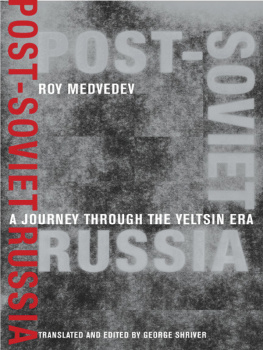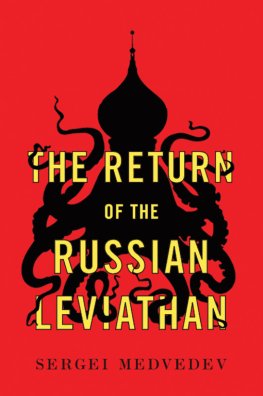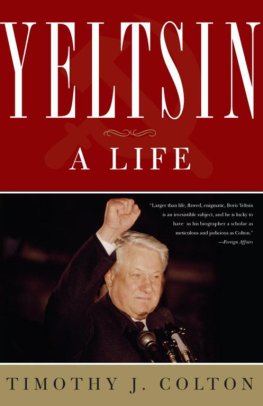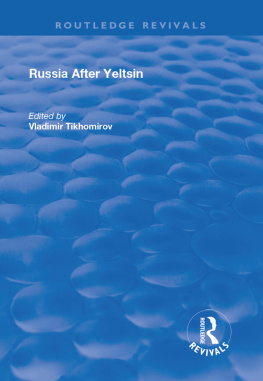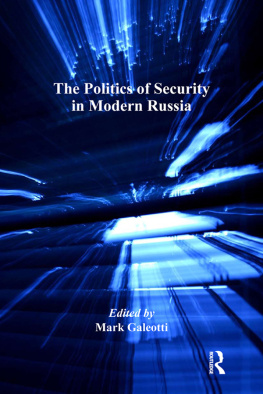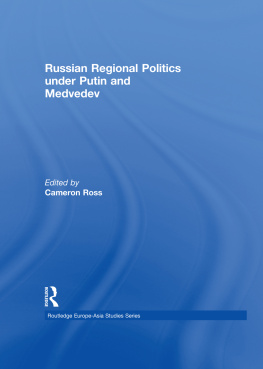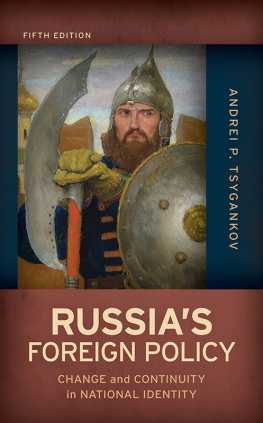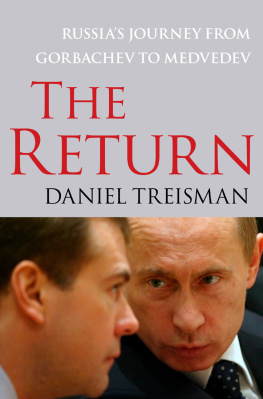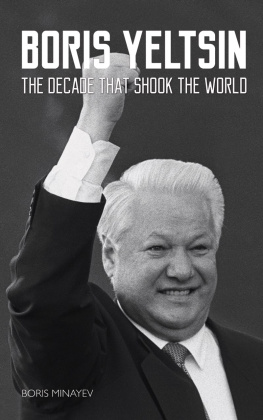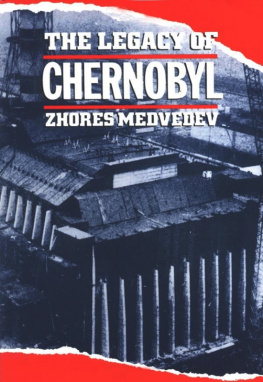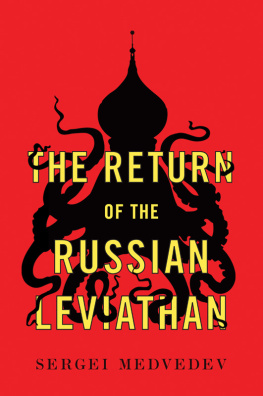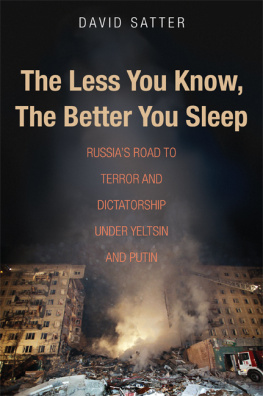Post-Soviet Russia
POST-SOVIET RUSSIA
A Journey Through the Yeltsin Era
Roy Medvedev
Translated and Edited by George Shriver
Columbia University Press New York
Columbia University Press
Publishers Since 1893
New York Chichester, West Sussex
cup.columbia.edu.
Copyright 2000 Columbia University Press
All rights reserved
E-ISBN 978-0-231-50263-4
Library of Congress Cataloging-in-Publication Data
Medvedev, Roy Aleksandrovich, 1925
Post-Soviet Russia : a journey through the Yeltsin era /
Roy Medvedev ; translated by George Shriver.
p.cm.
Includes bibliographical references and index.
ISBN 0231106068 (cloth : alk. paper)
ISBN 0231106076 (pbk : alk. paper)
1. Russia (FederationEconomic policy1991.
2. Russia (Federation)Economic conditions1991.
3. CapitalismRussia (Federation).
I. Title.
HC340.12.M429 2000
338.947'009'049dc21 00040443
A Columbia University Press E-book. CUP would be pleased to hear about your reading experience with this e-book at .
Contents
Much of this translation derives from a manuscript version of Roy Medvedevs Kapitalizm v Rossii? [Capitalism in Russia?] (Moscow: Prava Cheloveka [Human Rights Publishers], 1998. The authors work on the Russian book was completed in January 1998, although much of the text was written in 199596. The book investigates in depth the attempt to create a capitalist system in post-Soviet Russia during the 1990s. In this English version some of the chapters have been abridged and some appear in an order different from that followed in the Russian book. A certain part of the Russian manuscript, which we have included in this translation, was published in Russian in the pamphlet by Roy and Zhores Medvedev, Rossiya i Zapad v kontse XX veka [Russia and the West at the End of the 20th Century] (Moscow, 1997), but not in Kapitalizm v Rossii?
A special feature of this English version is ), which covers the critical events of 1998, and the Postscript on the further upheavals of 1999 through the December elections to the Duma (parliament) and the resignation of Russian President Boris Yeltsin.. The English version also contains an analysis of the 199596 elections that is more detailed than in the Russian book. This analysis pays special attention to Yeltsins chief opponent in the 1996 elections, Gennady Zyuganov, and his Communist Party of the Russian Federation (CPRF), including excerpts from the writings of Zyuganov and campaign literature and related material of the CPRF.
In effect this book reviews the entire Yeltsin era which is now coming to an endfrom Boris Yeltsins rise to dominance in the wake of the unsuccessful coup attempt of August 1991, through liberalization of prices, shock therapy, and privatization of state-owned industry to the tank bombardment of the Russian White House and dispersal of the Russian Supreme Soviet in October 1993, the elections of December 1993, then those of 199596, and finally, the crises of 1998, which resulted in the premiership of Yevgeny Primakov. The Postscript, as we have said, takes the story through the end of 1999.
In all this material the authors consistent theme is that imported schemes for creating a particular type of neoliberal capitalism in Russia cannot work. In his view, given Russias specific social, political, and economic characteristics in the twentieth century, a mix of government planning and market mechanisms seems more likely to be effective.
The book provides telling thumbnail sketches of many new figures who have trod the boards of Russian public life during the 1990ssome only briefly, others for a longer time: among them, Gaidar, Burbulis, Chubais, Chernomyrdin, Rutskoi, Khasbulatov, and more recently, Nemtsov, Kiriyenko, Lebed, Primakov, and Putin.
NOTE ON THE SPELLING OF RUSSIAN NAMES
The more familiar and readable system of Russian transliteration has generally been used, omitting diacritical marks (such as hard signs and soft signs) and in most cases using y rather than i or j, or -ii or -ij. (Thus, Gennady Zyuganov, not Gennadii Ziuganov, and Boris Yeltsin, not Boris Eltsin or Elcin.) Names of tsars are usually Anglicized. Titles of books or periodicals are sometimes given in the Library of Congress form of transliteration as an aid to readers wishing to locate them in a library catalogue.
Roy Medvedev
During the twentieth century Russia experienced a great number of political, social, and economic upheavals, accompanied by fundamental changes in property relations and the system of government. At the beginning of the century Russia was an enormous empire without any democratic institutions. As an absolute monarchy, the unifying factor in the system of government was the emperor, or tsar; in relations between nationalities, the unifying factor was the Russian language; and in matters of ideology, the unifying factor was the Russian Orthodox Church, which functioned as part of the government, there being no separation of church and state.
In the Russian empire ones rights were not restricted for reasons of race or ethnic origin, but there were restrictions on non-Russian languages and religions. The Austro-Hungarian empire, in contrast, published its legal code in all the languages of the nationalities included in that empire. The Russian empire published its laws only in Russian.
In Russia the autocracy relied mainly on the army to maintain power. For ideological support it relied on the formula autocracy, orthodoxy, nationalitythe third item in this formula standing for certain historical traditions of the Russian state.
The main economic conflict in Russia before World War I was not so much the struggle between bourgeoisie and proletariat over the ownership of industry as the struggle between the smallholder peasantry and the large landed proprietors over ownership of the land. The main conflict among nationalities had to do with forced Russification, especially after the decrees of Tsar Alexander III making Russian the only official language for use in government, the courts, and educational institutions from elementary school to the university level.
The Russian empire collapsed as a result of the February 1917 revolution and defeat in World War I. After the downfall of the monarchy a bourgeois-democratic republic arose briefly, but in October 1917 it too was overthrown by the more radical socialist parties. As a result of this revolution there began a radical transformation of property relations, which provoked a lengthy civil war. The Communist Party headed by Vladimir Lenin eventually triumphed in this civil war, and on the territory of the former Russian empire a new state took shapethe Union of Soviet Socialist Republics (USSR).
The Soviet government did not consider itself the legal heir of the Russian empire, and it publicly renounced the treaties signed by the former tsarist rulers of Russia, as well as the debts incurred by them. The dictatorship of the proletariat was proclaimed as the basic principle of government in the Soviet Union, but this soon evolved into the dictatorship of the Communist Party, which later developed de facto into a new form of autocratic rule by the general secretary of the party, Joseph Stalin. The ideology of Marxism-Leninism (as interpreted by Stalin) became the official ideology of the country, with repressive measures directed against all forms of religion.







